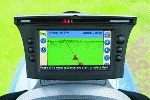
There is one bet you could make and be certain to win. Tractors and implements will feature more electronics and more automatic controls in the future, not less. That means the days of fiddling with the governor or changing spark plugs are likely over. It takes technicians trained on these machines to understand how they work, and what might go wrong. Otherwise, the electronic devices are black boxes that are great when they work, but worthless when they don't.
Who will train people to work on these devices and do other machinery repairs in the future? It's already happening in the John Deere training program offered at Vincennes University. The two-year program includes classes on how to work on GPS and Auto-steer, notes Tim Hale, program director. In fact, students in the program take a class on electronics every semester, and electronics are included as part of every course curriculum offered there.
The unique arrangement between John Deere and Vincennes dates back to the mid-80s. John Deere supplies training materials of all sorts for students to use. Two years ago, the flood that careened through southern Indiana wiped out the training facility. Through an agreement with Purdue University, Vincennes built a new, modern teaching laboratory on at the Southwest Purdue Ag Center just north of Vincennes,. The building also houses a Vincennes University program on diesel trucks not related to the John Deere program.
"We've got one graduate who now works as an AMS specialist for several John Deere dealers in close proximity to each other," he notes. All he does is work on electronics, auto-steering, GPS functions and the like."
Students entering the program must line up a john Deere dealer who will provide them with 10 weeks or work as an internship between their freshman and sophomore year. It's up to the students to find the dealership, Hale says. But since young trained mechanics are in high demand, that's usually not a roadblock that stops someone from entering the program.
Students are not bound to work for a Deere dealer after the program. In some cases, a dealer may work out a deal with a student outside of the program requirements so that the dealer pays part of the student's tuition in exchange for the student working for the dealer for a minimum amount of time after graduation. But some graduates work for other companies, or even in non-ag fields.
About the Author(s)
You May Also Like




